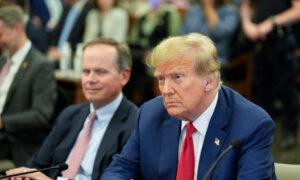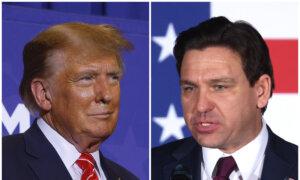The former president has handed a ballot win as the New Hampshire primary is scheduled to start Tuesday.
A federal judge in New Hampshire ruled against an effort to block former President Donald Trump from the state’s ballots, coming just before the state holds its first Republican primary election.
In his petition, the judge noted that Mr. Castro brought a “nearly identical” claim in New Hampshire as his petition to the U.S. Supreme Court, alleging that the former president is ineligible from appearing on the state’s ballots because of Section 3 of the Constitution’s 14th Amendment, which bars candidates from running for office if they engaged in an “insurrection” or “rebellion” against the United States.
Mr. Castro alleged that because he is a presidential candidate in New Hampshire, President Trump’s inclusion on the ballot injures him in the form of a “diminution of votes and/or fundraising.”
In dismissing the case, Judge Elliott said that Mr. Castro “conceded” at an evidentiary hearing “that he would not win any delegates even if the secretary of state were prevented from counting votes in Trump’s favor” and that Mr. Castro has “not proven redressability,” a legal term that means a court will be able to make up for or correct an injury of the plaintiff.
His motion for a preliminary motion in New Hampshire was then denied by the judge and that all other pending motions in the case were rendered moot before she dismissed his case.
As of Monday morning, Mr. Castro has not issued a public response to the decision. The Epoch Times has contacted Mr. Castro for comment in response to the New Hampshire judge’s decision.
“Judges are supposed to apply the law without fear or favor,” he wrote before adding that the “ federal judiciary has failed at this with these cases.”
Some political analysts have speculated that New Hampshire could be the best chance for Ms. Haley to pull off an upset against President Trump, coming weeks after New Hampshire’s Gov. Chris Sununu endorsed her.
Other Challenges
Although most courts and judges have rejected challenges to prevent President Trump from appearing on state ballots, the Colorado Supreme Court issued a 4–3 ruling about a month ago that argued the former president engaged in an insurrection over the activity on Jan. 6, 2021, when the U.S. Capitol was breached. He has never been charged with or convicted of engaging in an insurrection.
Since then, the former president’s legal team has appealed the Colorado high court’s ruling to the U.S. Supreme Court, which agreed to take up the case. And last week, President Trump wrote on Truth Social that he believes the nine justices will render a favorable decision in the case, arguing that doing otherwise would take away the will of voters.
In Maine, the Democratic secretary of state unilaterally decided to block the former president from appearing on the ballot days after the Colorado ruling. That decision was also appealed to the Supreme Court.
Aside from the ballot lawsuits, President Trump faces other legal hurdles as he tries to take back the White House for a second time. In multiple jurisdictions, the former president was charged with various state and federal crimes, including relating to allegations regarding his activity after the 2020 election, payments made during the 2016 campaign, and his handling of alleged classified records after he left office.
The former president has pleaded not guilty to all the charges, describing them as election interference.
Original News Source Link – Epoch Times
Running For Office? Conservative Campaign Consulting – Election Day Strategies!


